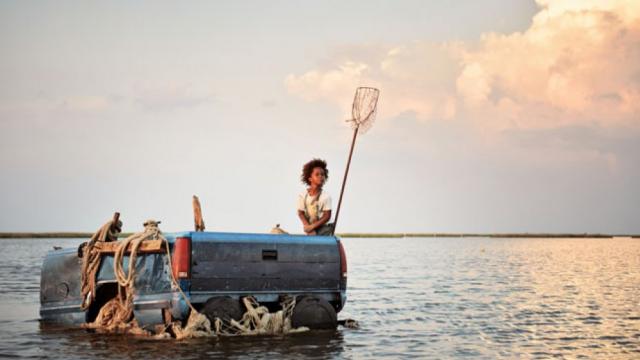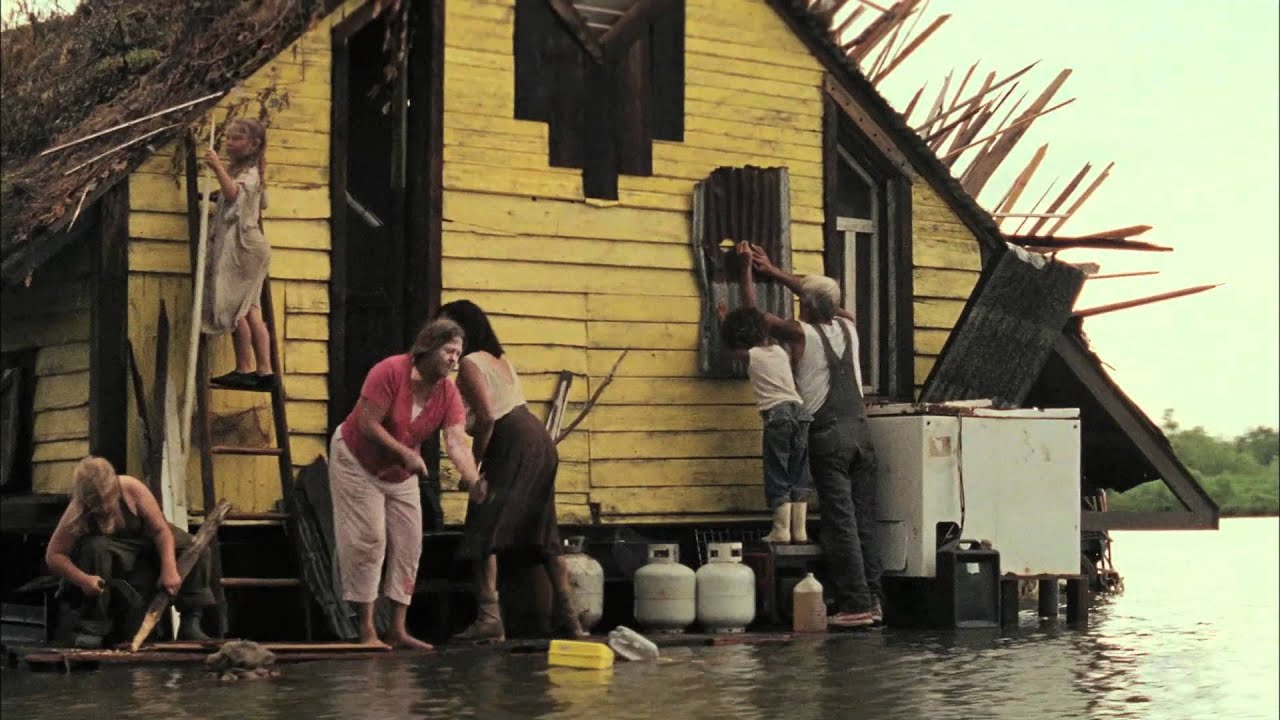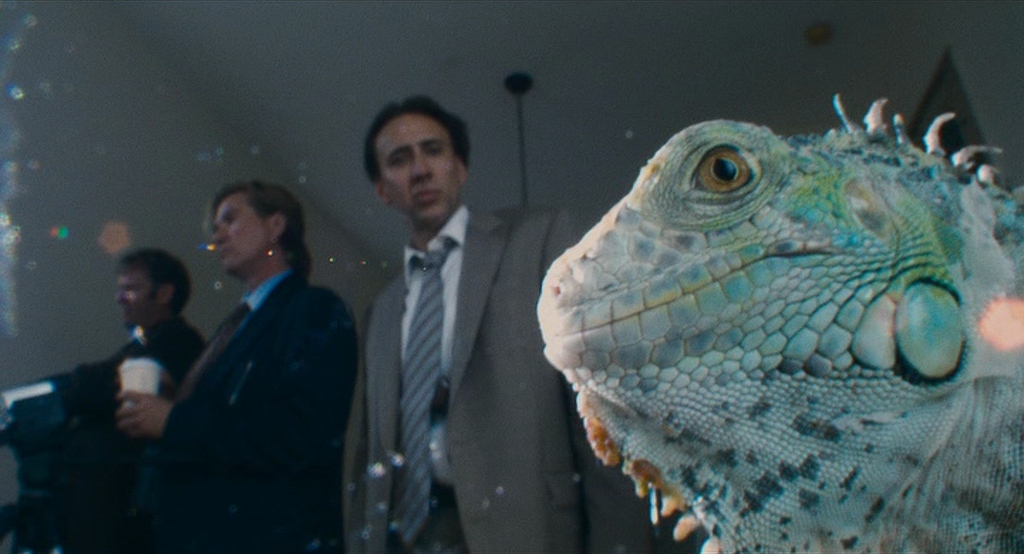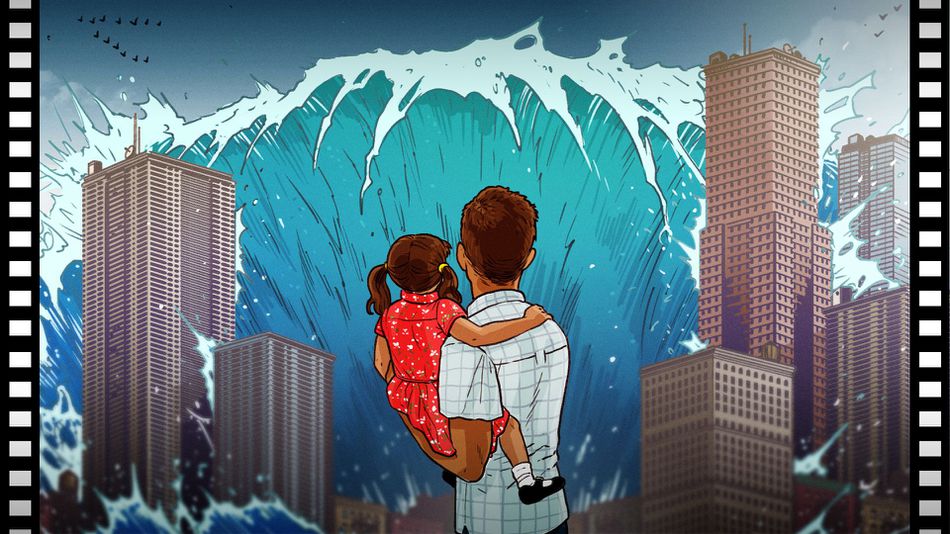
Beasts of the Southern Wild
I can remember sometime in the late 2000s, during one of those post-Katrina storms that knocked out everyone’s power for a few days, listening to a song called “Burns in the Rain” by The Jibbs – a mock band made up especially for this Hurricane, composed of members from the great King’s X. It described, in country detail, the trials and tribulations of waiting for respite from the humidity and the boredom that any powerless living brings after heavy rain and winds. We can certainly expect to see and feel more of these events in the not too distant future, and we can expect more songs for our listening pleasure to depict said occurrences.
What of the movies? Have there been any to properly articulate this all too familiar danger for the Gulf South? Of course, many a documentary have come and gone, showcasing the living and the dead of these tragedies and related incidents from our very man-made dilemma that is climate change. Some are more poignant than others, some more contextually incorrect than others. But what they all share is a listing under the umbrella of a new disaster flick subgenre, which I call “The 100 Year Storm Movie”. It may not roll off the tongue well, but we know them when we see them, because we’ve lived them.
And will continue to.
Two films come immediately to mind, which both represent different aspects of the urgency and the evil that these gulf storms bring upon our population. With your permission, allow me to expand on them:
Within the New Orleans film community, "Beasts of the Southern Wild" is seen as an outsider’s look at us poor folks, by some writers anyway. For me personally, beneath its veneer of a community on the edge of the world facing calamity and destruction, it’s also a touching story about fathers and daughters, and growing into maturity even if a bit early. Of course, there’s a storm involved, not to mention erosion of land and government takeover of property and persons too. "Beasts" details the magic and beauty of a small portion of the Gulf, where misfits and mistakes live and breathe, working together in a harmony rarely seen.
In "Beasts," we have a combination of elements at play. There’s Katrina imagery and suggestiveness, and coastal erosion themes as well. The area in question is known affectionately as “The Bathtub”, as it’s a village built on sinking land. Flooding happens too frequently, but there's a mild understanding that if you take care of others, you’ll be taken care of in return. This goes hand in hand with the environment, of course, until one of those nasty storms comes roaring from the ocean and brings wrath upon the river. A levee is blown in a drastic measure to offset their damage and, perhaps, in a retaliatory effort against those that have forgotten the people. Only here do rescue crews “save” these souls, bringing them into grey abandoned Wal-Marts for invasive medical treatment and bureaucratic numbering.
As a critical look at what happened and is still happening in the Gulf South, from the major cities to the swamps and bayous, "Beasts of the Southern Wild" exists as this very on-point and even pointy (perhaps finger-pointing too) narrative tale that demands justice, security and maybe sovereignty for these almost lost Parishes. We are the first Americans to be declared victims of climate change, and we likely won’t be the last in the state of Louisiana or in the Gulf South or in the United States. It’s all happening too soon and too bad.
On a similar if more dark-natured token, "Bad Lieutenant: Port of Call New Orleans" deals in the evil men do when they're allowed to do it and a system has been rained upon just enough to look the other way. Werner Herzog came to post-Katrina New Orleans over a decade ago, and made a Nicolas Cage vehicle that has burrowed itself in our very spirits since. Drug addiction, manipulation, intimidation, violence, and more are at the beck and call of one detective who, before Katrina, may have been entirely different, perhaps jokey but somewhat kindly. Afterward, he’s a broken back with a hook in his mouth for pain killers and bad deeds.
The allegory of Katrina turning good men bad is not difficult to believe. In the short-lived Fox show K-Ville, the pilot begins with a cop deserting his post on a bridge, something for which he tries to redeem himself months later, but might never be able. Indeed, things like this happened within our police department during the few long days when we were left to our own, with no power or structure. "Bad Lieutenant" calls upon this and goes further, months after it all went down, conveyed in a Nosferatu-ish performance from Nicolas Cage. It’s downright scary just how close his cop comes to the edge, only to be pulled back by fate and the forces of injustice that can only come from something as man-made as climate change-powered storms and the ignorance and intolerance that follows.
"Bad Lieutenant" is a cycle of evil, showcasing the ecstasy and the indifference of a universe and an environment gone rogue. People will suffer, good people really. And the only ones to survive will be those keen enough to exploit and connive. It’s a difficult pill to swallow, but a decade after its release, we’ve seen this to be true in our leaders and officials. Science be damned, there’s nothing to worry about, they shout down to us from the boats they’ve built for themselves. Evil is indeed inherent in our system of governance, in our system of justice and enforcement, and it’s truly exacerbated when disasters strike. Capitalism cares not for anyone but itself – and we are all cogs in its machine. Some of us churn this machine, some of us are trapped within. In the post-storm humidity of a new New Orleans, the churners have free reign and care from consequence. It’s their world now.
It’s likely we’ll see more of these kind of movies, just as likely we’ll see more of these storms. Heroes and villains will be revealed, in real and reel time. These “100 Year Storm Movies” are ripe for drama, but may pale in comparison to the tragedy the Gulf South faces on a daily basis. The lost land. The indifference and evil of men. The floods. The damage. Our culture and communities are under attack, and it’s high time we recognized the causes and did something to counter.
Am I asking for a miracle? Just open ears and minds. Maybe watch a movie or two. That might jog something in your conscience.














